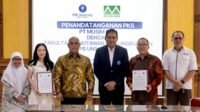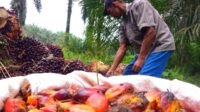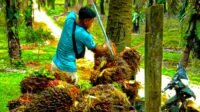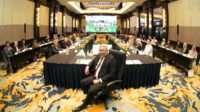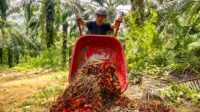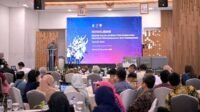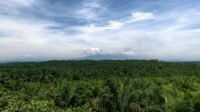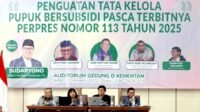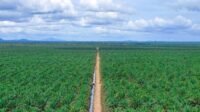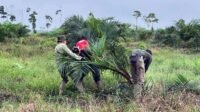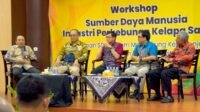PALMOILMAGAZINE, SAMARINDA — The Provincial Government of East Kalimantan is taking firm steps toward a green economic transition, with the palm oil sector positioned as a key driver of this transformation. Recognized for its strategic role in supporting sustainable development, the industry is now central to regional green growth initiatives.
This commitment was highlighted during the recent Regional Consultation Forum themed “Driving East Kalimantan’s Economic Transformation: Boosting Productivity and Sustainability in the Palm Oil Sector,” held at the East Kalimantan Plantation Agency (Disbun) office on Monday. The event was organized in collaboration with the Sustainable Plantation Communication Forum (FKPB) and international development partner GIZ.
The forum was opened by Asmirilda, Head of Sustainable Plantations Division, representing the Acting Head of Disbun East Kalimantan. In her remarks, she underscored palm oil’s contribution as the third-largest component of East Kalimantan’s Gross Regional Domestic Product (GRDP), following coal and oil & gas. The sector also absorbs about 12% of the province’s workforce.
Also Read: HCV Areas: Climate Shield and Biodiversity Investment for Independent Palm Farmers
Despite its significant contribution, Asmirilda acknowledged pressing challenges, including low productivity and uneven adoption of sustainability standards among smallholders.
“This transformation must focus on improving plantation practices and integrating social and environmental principles. Strengthening supply chains, training for field officers, providing incentives, and establishing a robust monitoring system for companies are critical pillars,” she said, as quoted by Palmoilmagazine.com on Wednesday, July 23, 2025.
She expressed optimism that if the strategy is implemented consistently, palm oil productivity could rise from 2.8 tons to 5 tons of CPO per hectare per year. This increase would potentially double regional revenue from palm oil-based revenue-sharing funds.
Yus Alwi, Executive Chair of FKPB Kaltim, also emphasized the importance of cross-sector collaboration. He noted that the success of this economic shift relies not only on government efforts but also on strong commitments from the private sector, communities, and development partners.
“Collaboration is key. We hope this forum not only serves as a platform for discussion but also leads to concrete commitments to enhance competitiveness and maintain sustainability in East Kalimantan’s palm oil industry,” said Yus.
The forum was also attended by stakeholders including Ade Cahyat, Fajar Lismawan, and Iwied from GIZ, along with senior officials from Disbun East Kalimantan and experts from FKPB.
It is hoped that the outcomes of this meeting will serve as the foundation for a regional strategy aligned with East Kalimantan’s green development agenda—ultimately positioning the province as a national model for sustainable palm oil–based economic transformation. (P2)





